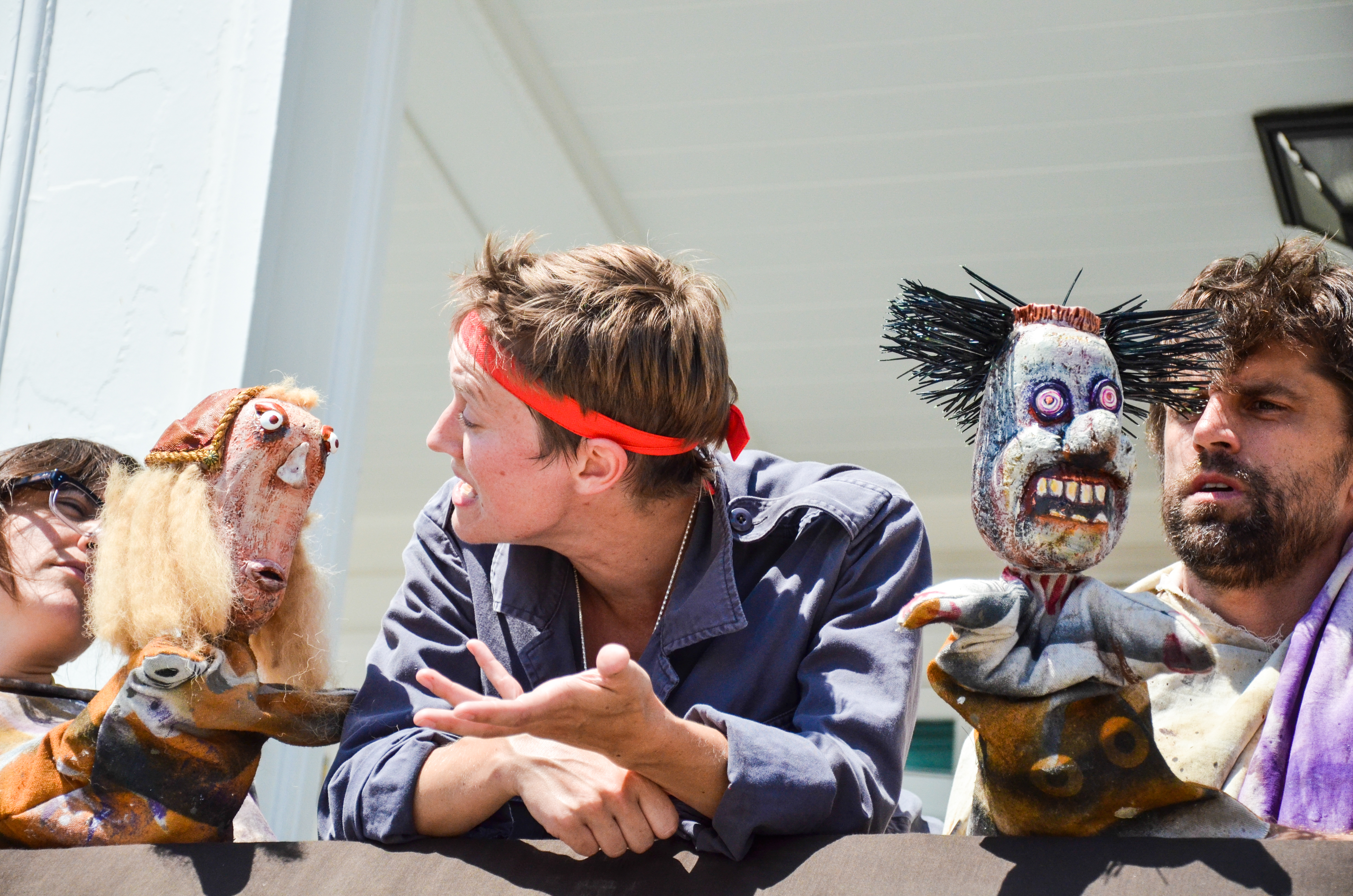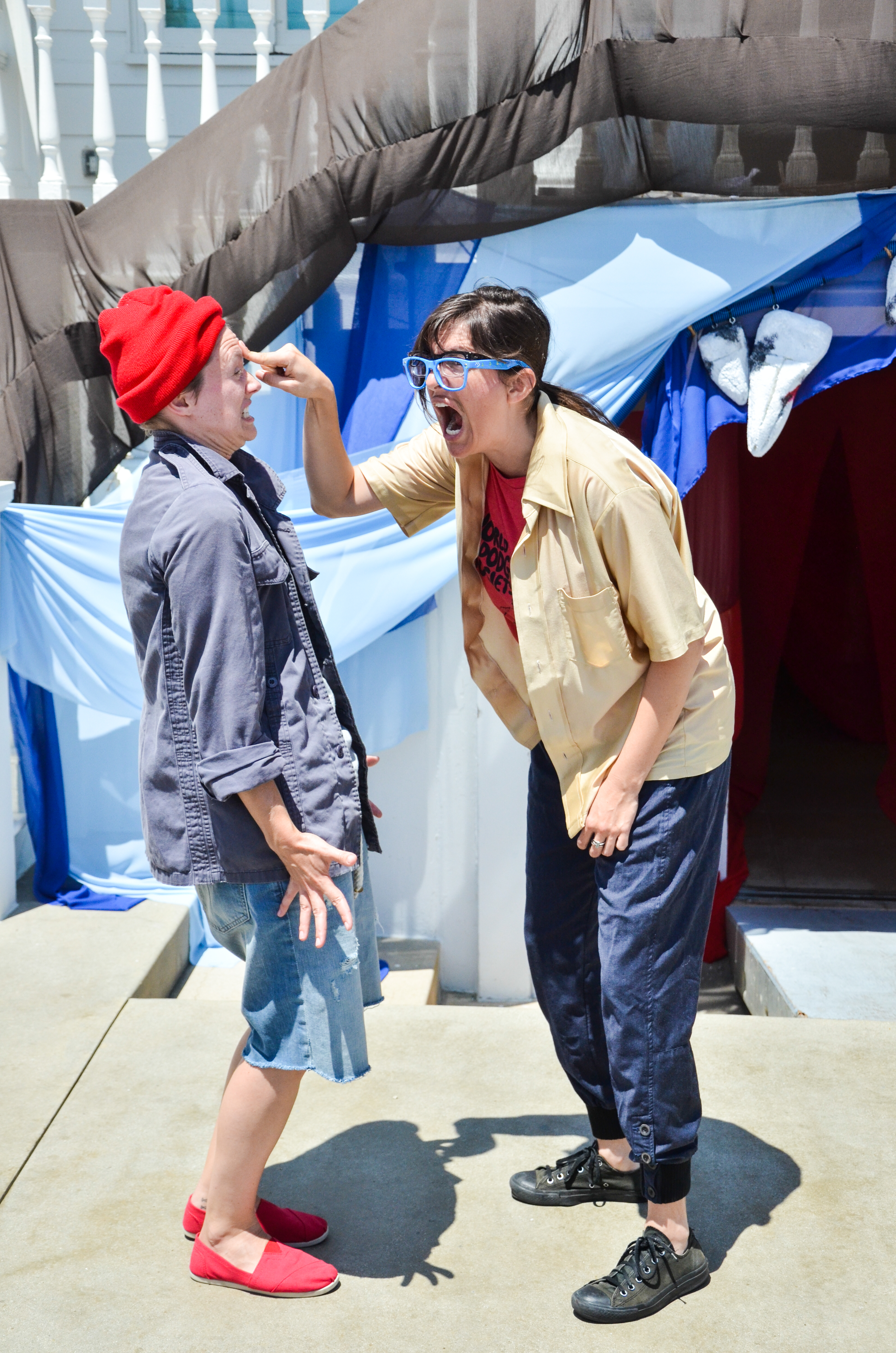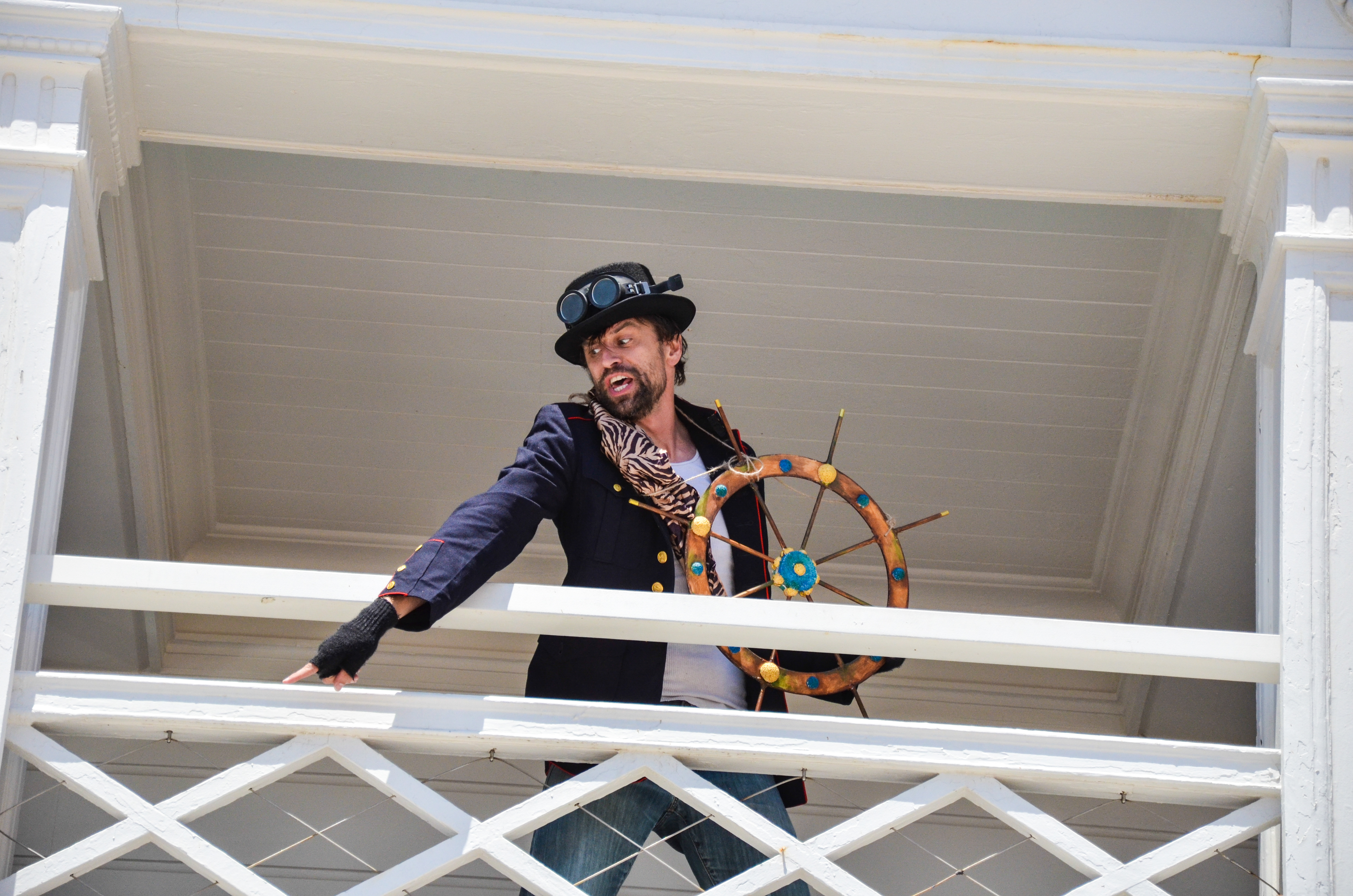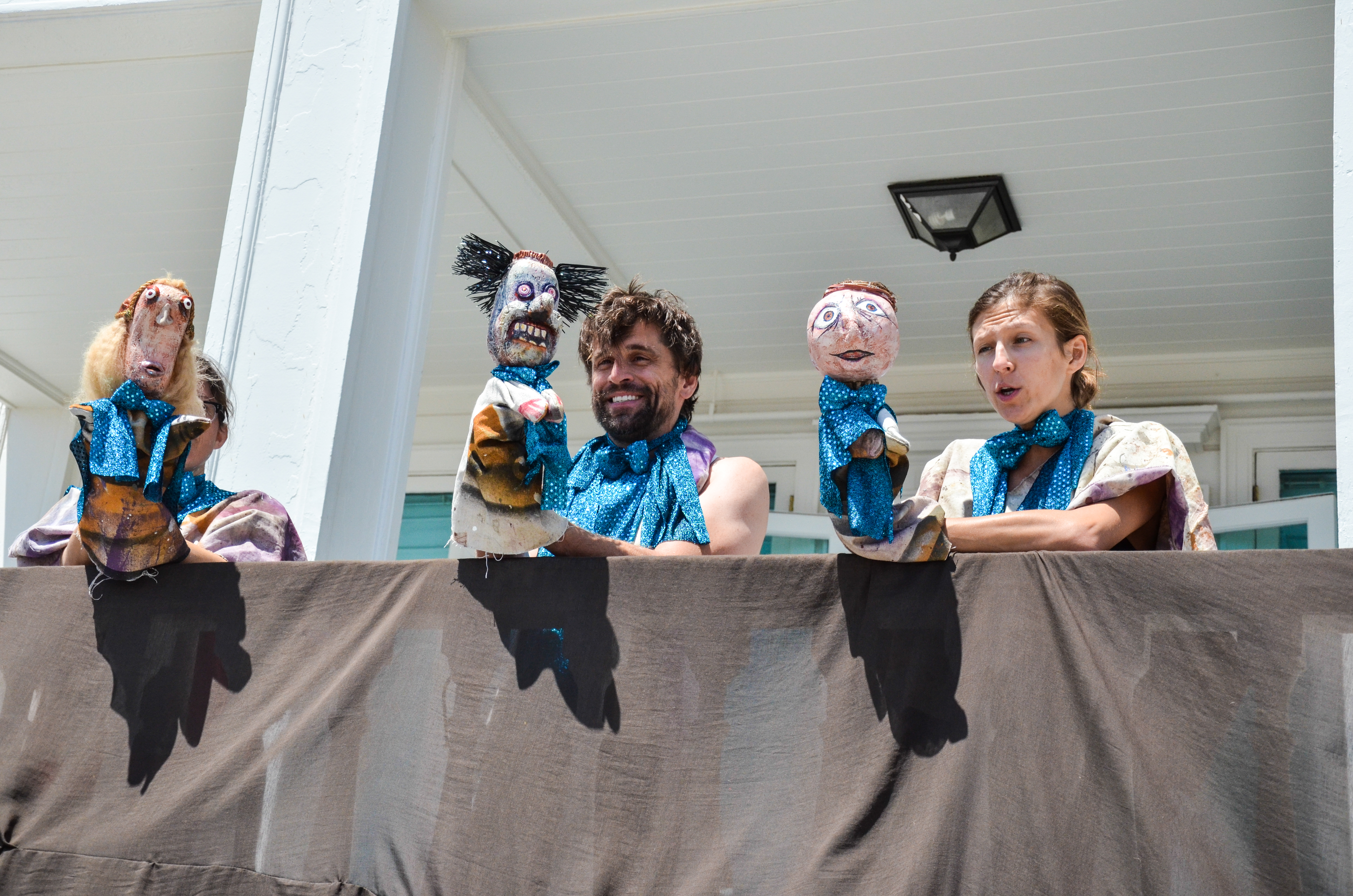









Four Clowns presents
Jonah
by David Bridel
directed by Jeremy Aluma and David Bridel
July 2014
at Annenberg Beach House (Santa Monica, CA)
“a psychedelic odyssey” – Night-Tinted Glasses
“full of adventure, song, dance and magic” – LA Art Examiner
“The humor is edgy, dark” – Jewish Journal
“food for thought as well as laughter” – Random Lengths
STARRING
Don Colliver as CAPTAIN
Dave Honigman as GOD
Jamie Ann Hultgren as SIRI
Connor Kelly-Eiding as SINGING TREE
Amir Levi as WHALE
Lis Roche as JONAH
Anna Walters as ALAN
Produced by the City of Santa Monica, Annenberg Beach House, Four Clowns, Naomi Okuyama, and Jeremy Aluma
Masks & Puppetry Design: Bob Beuth
Set & Props Design: Yuri Okahana
Costume Design: Candy Jo Dahlstrom
Stage Manager: Ashley Jo Navarro
Assistant Stage Managers: Jinwoo Jung & Julianna Stephanie Ojeda
Assistant Directors: David Anis & Benji Kaufman
Noah, an exceedingly devout rule-follower, is faced with the most fantastic of tasks as God promises to destroy everyone on earth with a great flood. Despite the doubts of his aggravatingly inquisitive wife, Noah sets out to prove he’s the man for the job, regardless of the cost. Delightful puppets and masks accompany Noah in his amazing journey to become the father of the world. Meanwhile, Jonah – lazy, fitful, argumentative Jonah – is charged with a mission he doesn’t want and escapes as a stowaway on a boat bound for nowhere. Before he knows it, he is deep in the belly of a whale and forced to confront what he’s been running from. This modern hipster take on the incredible adventure is full of song, dance, puppetry, and magic.
Can anything be better than a relaxing afternoon at the beach?
How about a relaxing afternoon at the beach and an intriguing and original play, thrown in for free?
That’s what Four Clowns, the very successful LA-based acting company, is offering through at the Annenberg Beach House in Santa Monica. The Annenberg Beach House is an almost perfect place to enjoy the waves, the pool, an attractive beach-front lunch or just a walk along the remarkably deserted boardwalk. The Beach House, built on the property that once hosted William Randolph Hearst’s beach property more than 50 years ago, must be packed on the sunny weekends this summer. But in mid-week the beach is hardly peopled. Hard to believe it is the premier beach of one of the biggest cities in the country.
Four Clowns uses the front porch of the Marion Davies Guest House (two stories but still a cottage and the only original structure to survive from the 1920s development) to present their visions of the Bible, telling the stories of Noah and Jonah on alternate days at 4:30 p.m.The plays are much less than formal. Young children gather on beanbag chairs (and sometime squirm or start playing) as adults watch from umbrella-shaded seats. In Noah God is represented by a big papier-mâché mask as he demands that Noah do his bidding. But he often has to re-calculate as Noah builds the ark and helps re-people the world. In Jonah there is a god of a very different kind: a skate-boarding dude who gives his orders while relaxing and riding a bicycle (a perfect beach relaxation, even for God.)
David Bridel scripted Noah, and it is directed by Bridel and Courtney Buchan. Don Colliver stars as Noah, who finally agrees to do what God demands. Jamie Ann Hultgren is Noah’s wife, who doesn’t quite agree with what is happening. Dave Honigman does triple work as Noah’s three sons, one a militaristically directed obedience freak, another a reasonable man and, at the turn of the cap the third: the comically stupid Ham. There are puppets, too, of all the animals on the ark, including an incontinent dove who flies around the audience peeing indiscriminately as she flies (Connor Kelly-Eiding does that comic job.)
Jonah is by David Bridel, directed by Bridel and Jeremy Aluma. Dave Honigman is God, skate-boarding his way around. Lis Vizcarra is Jonah, who gets swallowed by the big mouth of the whale, with whale played by Amir Levi in a red clown-nose and blue hat. The story is familiar, but there are parts of the biblical story that aren’t familiar and they are included as well.
Both stories are comic, even hilariously so, but they are based on the originals in a way that makes them thought-provoking as well as comic, — food for thought as well as laughter. And then, there is the beach with the ocean just a short walk away, — a great way to relax a day away. These are the first of a series of Bible-based drama-comedies Four Clowns is planning in the next few years.
– John Farrell
If you were asked to picture a clown, you’d probably imagine baggy pants, suspenders, white face paint and a red nose. That’s the traditional view, but David Bridel, associate director of the theater troupe Four Clowns, thinks clowns get a bad rap.
“There is a deep and lasting clown culture that I feel safe in, but the general public doesn’t understand it, trivializes it or thinks of it as antiquated,” Bridel said. “I don’t think any of that is true.”
Bridel is the founder and director of The Clown School, based in Los Angeles, and co-director of “Noah & Jonah,” two plays being performed together at the Annenberg Community Beach House.
The performances (4:30 p.m. July 10-11 and 16-18) diverge wildly from children’s Bible stories taught in school. The humor is edgy, dark, adult-oriented — and there are puppets. These are not your children’s birthday party clowns.
On a recent Tuesday evening, as the sun set over the Pacific Ocean, five actors stood atop the stairs leading to the site’s Marion Davies Guest House, rehearsing their lines while holding handcrafted puppets of giraffes, elephants, mice, gorillas, crocodiles and rams.
“Maybe we could brainstorm the stereotypes of the animals?” Courtney Buchan, co-director of “Noah,” suggested to the assembled actors. “Like, maybe the crocodile is always trying to nibble on somebody?”
The actors filed inside, sat in a circle, and acted out a scene of animals being led aboard Noah’s Ark, swapping lines in goofy cartoon voices as the others laughed and took notes. “See you later, alligator!” “We’re crocodiles — you probably think we all look the same!” “You know the baggage restrictions, one trunk per elephant!” “How could we forget?” “Glad we made the cut, unlike the unicorns.” “Wait, you’re both rams!” “You have a problem with that?” “This is California, isn’t it?” “Some of my best friends are rams!” “Some are bears!”
A lot of the show’s jokes are intended for adults and will fly over kids’ heads. Like “The Simpsons,” the humor is meant to work on multiple levels. Improvisation is at the heart of how Four Clowns operates. The actors spent a couple of weeks improvising scenes based on biblical passages.
Bridel filmed them, then stitched their jokes together into a cohesive script, which is continually being fine-tuned. And, unlike traditional theater, anything can happen during the performance. The unexpected is part of the process. “It’s all based on risky interaction with an audience,” Bridel said. “Clowning is full of surprise, revealing what’s scary or crazy or ugly about people. It’s a celebration of one’s mistakes, in public. It’s all about revealing human flaws and enjoying them.”
That’s what drew actress and comedian Anna Walters to study with Bridel at The Clown School. “At first, I looked at clowning with suspicion, disgust and maybe a little bit of pity. I assumed it was like Bozo,” said Walters, who became a company member in February. “But actually, it’s about exposing the best and worst in humanity, by exposing yourself in failure as much as in triumph, and celebrating both. It has room to be both subversive and liberating.
For clowns, there’s no fourth wall. It’s direct engagement.” Four Clowns takes its name from its inaugural production of the same name, first performed in 2010 at the Hollywood Fringe Festival. The following year, they took on “Romeo & Juliet.” The company has since expanded to about two dozen performers.
To help inform the writing of “Noah & Jonah,” Four Clowns founder and artistic director Jeremy Aluma asked Rabbi Adam Greenwald, director of the Miller Introduction to Judaism program at American Jewish University, to explain to the actors the rabbinic interpretations of the stories of Noah and Jonah. “We wondered, is Noah a hero? He’s sort of this jerk,” Walters said. “He never tries to save anyone. He just does what God says.”
Greenwald explained that the debate over Noah goes back to talmudic times. “Noah is described as ‘a righteous man in his generation,’ ” Greenwald said. “As most rabbis interpret it, in his particularly awful generation he was a little bit better, as opposed to someone you’d actually want to know in life.” Greenwald explained that rabbis and scholars compare Noah to Abraham and Moses, who challenged God’s decisions.
“There’s a consistent train of commentary that has seen Noah as a spiritual failure, for failing to speak up on behalf of humanity to God,” Greenwald said. “Most rabbis criticize Noah for his obedience, wishing he had more chutzpah.” That view corresponded with what the actors came up with in their improvised scenes. “In our irreverent approach to this, we arrived at a similar place, that Noah’s not a model to follow,” Walters said. “If Noah survived the flood, he’s the father of all humanity, and that’s what makes it so interesting, because he’s flawed.”
Jonah is viewed by religious scholars as a flawed character, as well. “Jonah is sort of an example of schadenfreude, of a figure who wants to see people punished and takes pleasure in seeing people be punished,” Greenwald said. “Jonah’s mission is to go to Nineveh and change their ways, lest they be destroyed. But Jonah ruins the mission, because he doesn’t want the possibility of Nineveh [changing]. In fact, he tells God, ‘I know you’re a forgiving God; I didn’t want them to change because I didn’t want you to forgive them.’ ”
Nineveh was the capital of the Assyrian empire, which conquered Israel and forced the Jewish Diaspora. “It makes sense Jonah wouldn’t want to be the one to tell Nineveh to change,” Greenwald said. “It’d be like in the 1940s, being sent to Germany and telling the Nazis to change.”
There’s a reason that rabbis like to tell the story of Jonah on Yom Kippur, Greenwald said. “It’s a story about the part of ourselves that believes forgiveness shouldn’t be possible for bad people. Judaism teaches that if someone changes, there should be the possibility for forgiveness. Deep down we want to see people justly punished. We want them to get theirs, and we feel cheated if they don’t.
It’s a human instinct, but not necessarily one of our higher instincts,” he said. “It’s ultimately tremendously destructive.” The Four Clowns performance contains a taste of that theological debate — in between slapstick comedy and poop jokes. “We try to preserve questions about the nature of faith and the nature of God’s will, and I hope the audience picks up some of the serious themes among the tomfoolery,” Bridel said.
– Avishay Artsy
Four Clowns is a theatre company which eschews naturalism in favor of…well…the stuff of clowns. By that I mean a lot more than a bright red nose (although such remains in evidence). Rather they take the flare, the exageration, the bright colors and obvious gags as a springboard into their shows. The result feels up close and personal, funny, surprising and pushes us the audience outside the box of how to see the world.
Potentially, this can be great!
Noah In the two shows Noah and Jonah (both by David Bridel) the result qualifies as ‘great’ easily. But what do I mean by ‘great’? Well, first of all the plays entertain on many levels. Both are based on the biblical tales (and I must admit the second is something of a favorite of yours truly). Yet each ends up told in such a deliciously over-the-top way, the manner you might expect in a children’s show with puppets and sound effects and anachronistic silliness. Yet all this glorious tomfoolery remains aimed at adults. Puppets of the Wicked People in both plays gloat at how awful they are, cackling like cartoon villains but describing acts more worthy of Hannibal Lecter than Witchie-Poo (if you don’t get that reference go do a search for “H.R.Puff-n-Stuff” at once!). God appears as a character in both plays, both as strange and amusing presences that might well upset those deeply wedded to more traditional depictions of the almighty.
For the record, I didn’t mind at all. Although quite devout, I saw these plays as fitting very much into what I personally see as the purpose behind Creation–for the Divine to become something new by enacting out a universe. But I digress…
‘Great’ also because the shows move, provoke, entertain and remain surprising yet weirdly logical throughout. They re-imagine stories we all know in ways to make us question them, our assumptions and even ourselves without force-feeding answers. Yet they remains charming as well as simply fun.
Noah tells the story we’ve all heard, of a wicked world that God decides to purge and the one family Chosen to survive. In this one God is a huge face and hand way up in the sky. Amid it all is a blend of the slapstick with the profound, especially when it comes to Noah himself and his wife Delilah (nice touch that God keeps getting her name wrong).
Jonah goes further in the re-telling, turning the story of a deeply reluctant prophet who finally does God’s will only to see God forgive the city Jonah warned when they repented. In this one, Jonah is a modern day “dude” in Los Angeles who’s writing a screenplay about his life, and keeps trying to take a long nap rather than face any real issues. God in this one is a hippie on a skateboard, but increasingly we realize that is nothing but a mask for something we probably cannot ever really understand. It becomes a psychedelic odyssey for Jonah, complete with a strange friendship he develops with The Whale.
All of which adds up to a thought-provoking piece of total charm, one which reminds us (maybe) that the destination is not unimportant but the journey is what counts–not so much where you go and what you do, but who you are and become.
– David MacDowell Blue
These clowns aren’t clowning around, or are they? Four Clowns is a troupe of performers who are not clowning around about treating their clowning as an art form. Founder and artistic director Jeremy Aluma studied under David Bridel, USC’s MFA acting program and founder of Four Clowns sister company the Clown School.
The company’s repertoire is divided into adult and kid-friendly shows. Noah and Jonah are both in the adult category juxtaposing God’s beleaguered acolyte Noah against shiftless Jonah with each show illustrating different attitudes these men take toward their responsibilities.
Noah a serious rule-follower is faced with the seemingly impossible task of saving the world from God’s promise to destroy everyone on earth with a great flood. Delightful puppets and masks accompany Noah on his amazing journey as he sets out to prove that he is the man for the job.
Jonah, lazy and argumentative escapes from a mission he doesn’t want by becoming a stowaway on a boat bound for nowhere. Before he knows what happened he finds himself in the belly of a whale and if forced to confront what he’s been running hiding and running from.
The clowns are serious about their art, but not too serious; these performances with their modern take on biblical stories are full of adventure, song, dance and magic.
– Cynthia Lum